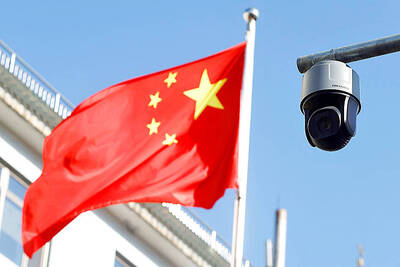The adoption of a Westernized writing format for government documents is not an attempt at desinicization, but a concerted effort at globalizing Taiwan's ossified bureaucracies and upgrading the nation's competitive edge, Premier Yu Shyi-kun said yesterday.
Although the reform measure did not seem significant, Yu said that it would have a momentous impact on the government's efficiency and the nation's competitiveness.
"The government's attempts to adopt a Westernized writing style for official documents over the past decades will finally bear fruit today, after being thwarted by calls to revive the so-called `Chinese culture,'" Yu said.
"We've wasted 30 to 40 years in an attempt to campaign for a change in writing style, and we cannot afford to wait any longer," he said.
Yu made the remarks yesterday morning while delivering the opening speech at a ceremony of the adoption of a Westernized writing format for government documents and the publication of the integrated online edition of a government bulletin, the Executive Yuan Gazette.
The official bulletin is designed to integrate 20 government bulletins published by the Executive Yuan and 19 of its ministries.
In addition to the online edition, the publication will continue to be printed daily, except for weekends and national holidays.
As even the Chinese government has already changed its writing format to a Western style, Yu said that it does not make sense to criticize Taiwan for adopting the same writing style as an act of desinicization.
"If adopting a Westernized writing format for government documents is desinicization, then it is China who has taken the initiative and gotten rid of `Chinese culture,' not Taiwan," he said.
Yu also called on the public not to politicize the matter because, Yu said, the reforms are being undertaken to get ready for the era of globalization and upgrade the nation's competitive edge.
"If some traditions make things insufficient, obsolete and inflexible, they have to be done away with," he said.
In line with global trends, the Cabinet in August last year approved draft amendments to the Decree Governing the Writing of Official Documents (公文程序條例), which would adopt the Western writing format for government documents. The draft was approved by the legislature in May last year.
Prior to the legal revision, government documents -- except for charts, graphics and statistical reports -- ran from right to left and from top to bottom.

POLAM KOPITIAM CASE: Of the two people still in hospital, one has undergone a liver transplant and is improving, while the other is being evaluated for a liver transplant A fourth person has died from bongkrek acid poisoning linked to the Polam Kopitiam (寶林茶室) restaurant in Taipei’s Far Eastern Sogo Xinyi A13 Department Store, the Ministry of Health and Welfare said yesterday, as two other people remain seriously ill in hospital. The first death was reported on March 24. The man had been 39 years old and had eaten at the restaurant on March 22. As more cases of suspected food poisoning involving people who had eaten at the restaurant were reported by hospitals on March 26, the ministry and the Taipei Department of Health launched an investigation. The Food and

A fourth person has died in a food poisoning outbreak linked to the Xinyi (信義) branch of Malaysian restaurant chain Polam Kopitiam (寶林茶室) in Taipei, Deputy Minister of Health and Welfare Victor Wang (王必勝) said on Monday. It was the second fatality in three days, after another was announced on Saturday. The 40-year-old woman experienced multiple organ failure in the early hours on Monday, and the family decided not to undergo emergency resuscitation, Wang said. She initially showed signs of improvement after seeking medical treatment for nausea, vomiting and diarrhea, but her condition worsened due to an infection, he said. Two others who

The long-awaited Taichung aquarium is expected to open next year after more than a decade of development. The building in Cingshui District (清水) is to feature a large ocean aquarium on the first floor, coral display area on the second floor, a jellyfish tank and Dajia River (大甲溪) basin display on the third, a river estuary display and restaurant on the fourth, and a cafe and garden on the fifth. As it is near Wuci Fishing Port (梧棲漁港), many are expecting the opening of the aquarium to bring more tourism to the harbor. Speaking at the city council on Monday, Taichung City Councilor

Taiwanese should be mindful when visiting China, as Beijing in July is likely to tighten the implementation of policies on national security following the introduction of two regulations, a researcher said on Saturday. China on Friday unveiled the regulations governing the law enforcement and judicial activities of national security agencies. They would help crack down on “illegal” and “criminal” activities that Beijing considers to be endangering national security, according to reports by China’s state media. The definition of what constitutes a national security threat in China is vague, Taiwan Thinktank researcher Wu Se-chih (吳瑟致) said. The two procedural regulations are to provide Chinese